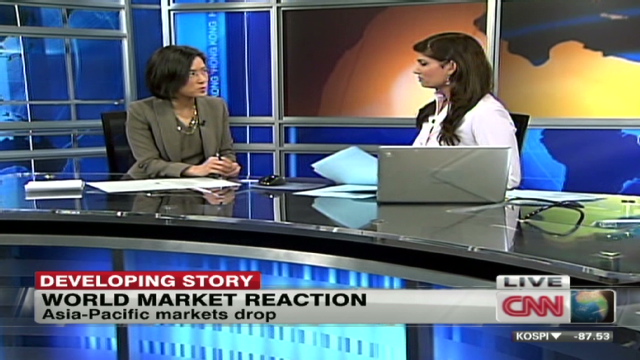 (CNN) -- Europe's stock exchanges were falling in Monday trading following widespread selling across Asia as investors reacted to Friday's unprecedented downgrade of the U.S. by ratings agency Standard & Poor's.
(CNN) -- Europe's stock exchanges were falling in Monday trading following widespread selling across Asia as investors reacted to Friday's unprecedented downgrade of the U.S. by ratings agency Standard & Poor's.
The stock markets had opened firmer than some had feared, but have ticked down steadily since the open. The move from Standard & Poor's to downgrade the country from AAA to AA + triggered heavy criticism from U.S. President Barack Obama's administration amid fears it could contribute to another recession.
Standard & Poor's John Chambers told CNN the downgrade was based on the political polarization in the U.S., following debate over raising the borrowing ceiling, and the country's high levels of debt.
Moody's, another major ratings agency, affirmed its rating of the U.S. debt at Aaa on August 2. It has said a ratings downgrade is possible before 2013 if fiscal discipline is weakened or by a significant deterioration in economic outlook.
By midday London time the FTSE 100 index had dropped 1.93%, while France's CAC 40 index had fallen 1.8% and Germany's DAX index was 2.45% lower.
In the U.S., stocks appear set to fall on the open.
In Asia key stock exchanges lost ground across the board Monday.
Tokyo's Nikkei index closed down 202 points, or 2.2%.
South Korea's KOSPI index slipped 3.8%. The Korean Stock Exchange halted trading for five minutes when the index fell 5.5%. It was the first time this year that the circuit breaker has been implemented.
In Australia, the All Ordinaries index lost 2.7%. The Shanghai composite slipped 3.8% lower.
Hong Kong's Hang Seng index tumbled 2.2%.
Similarly, U.S. stock futures were down about 1.25% - 1.4% in early electronic trading Monday. The Dow Industrials are poised to open some 154 points lower.
The futures were the first U.S. gauge of investor sentiment following Friday night's downgrade, removing the United States' AAA status for the first time. They give an indication of how investors will react when regular-hours U.S. trading begins at 9:30 a.m. ET Monday.
Besides the U.S. downgrade, investors are concerned about the debt crisis in some European nations, though actions on the part of the G7 and the European Central Bank Sunday helped to allay some of those fears.
Financial representatives of leading industrial nations said they are committed to taking "all necessary measures to support financial stability and growth in a spirit of close cooperation and confidence."
The G7 nations are the United Kingdom, France, Germany, Italy, Japan, Canada and the United States.
Similarly, the European Central Bank made a bid to calm markets Sunday. It said it would implement a bond-purchase program and welcomed announcements by Italy and Spain on new measures meant to reduce their deficits. It told the governments of those countries that a "decisive and swift implementation" of reforms is "essential."
European bond markets were rallying in response to the announcement during morning trading.
The move represents an escalation in the official response to Europe's debt crisis, which is now more than a year old and until recently was contained to smaller economies like Greece, Ireland and Portugal.
International Monetary Fund Managing Director Christine Lagarde cheered the announcements.
"I welcome the statements from the European Central Bank, from the leaders of Germany and France as well as from the G7, and their renewed commitment to take all necessary action in a coordinated way to ensure stability and liquidity in the financial markets. This cooperation will contribute to maintaining confidence and spurring global economic growth," she said in a statement.
U.S. officials are talking to a "wide range of investors" about the downgrade by the credit agency to try to "mitigate" any short-term negative impact from Friday's announcement, a Treasury official told CNN.
A Standard & Poor official said Sunday that the downgraded credit rating for the United States was both a call for political consensus on significant deficit reduction and a warning of possible further credit problems down the road.
"We have a negative outlook on the rating and that means that we think the risks currently on the rating are to the downside," said David Beers, the S&P global head of sovereign ratings, on "Fox News Sunday."
However, Beers said markets were reacting to the debt crises in some European countries and fears of a global economic slump, rather than the U.S. credit downgrade alone.
Both Beers and Bill Miller, chairman and chief investment officer at Legg Mason Capital Management, told the Fox program that they don't expect the U.S. downgrade to cause a spike in interest rates, one of the possible results of the higher risk now attached to U.S. debt.
"I don't think we'll pay more in interest," Miller said, calling the downgrade more of a symbolic event than an economic event.
A top market-watcher with HSBC agrees, saying the fear of rising interest rates is "quite sensationalist."
"AA+ is still a good credit. The implied difference between AAA and AA+ is exceedingly marginal and very very small," said Ben Pedley, senior director and head of investment strategy at HSBC.
"Expecting something cataclysmic to happen in the U.S. is just not the case," according to Pedley, who acknowledged that the timing of the downgrade was a surprise given the state of the markets last week.
Rating agencies such as S&P, Moody's and Fitch analyze risk and give debt a grade that is supposed to reflect the borrower's ability to repay its loans. The safest bets are stamped AAA.
CNN's Tom Cohen, Kyung Lah, Ed Payne, Pamela Boykoff, Jiyeon Lee and Mark Meinero and Irene Chapple contributed to this report.



